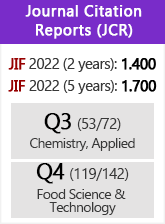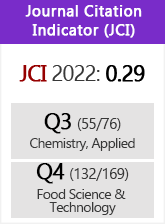Olive oil in food spreads
DOI:
https://doi.org/10.3989/gya.2004.v55.i1.151Keywords:
Olive oil, Hydrogenation, Trans fatty acids, Monounsaturated fatty acids, Fat spread, Mediterranean dietAbstract
Chemical hydrogenation of unsaturated fatty acids is a commonly applied reaction to food industries. The process may imply the movement of double bonds in their positions on the fatty acid carbon chain, producing positional and geometrical isomers ( trans fatty acids). Through hydrogenation, unsaturated oils are converted to margarines and vegetable shortenings. The presence of trans fatty acids in foods is undesirable, as trans fatty acids raise the plasma levels of total and low-density lipoproteins (LDL), while decrease the plasma level of high-density lipoproteins (HDL), among other effects. The use of olive oil to prepare fat spread opens new insights into the commercial development of healthy novel foods with a positive image in terms of consumer appeal.
Downloads
Download data is not yet available.
Downloads
Published
2004-03-30
How to Cite
1.
Blanco Muñoz MA. Olive oil in food spreads. Grasas aceites [Internet]. 2004Mar.30 [cited 2024Apr.17];55(1):92-4. Available from: https://grasasyaceites.revistas.csic.es/index.php/grasasyaceites/article/view/151
Issue
Section
Monography
License
Copyright (c) 2004 Consejo Superior de Investigaciones Científicas (CSIC)

This work is licensed under a Creative Commons Attribution 4.0 International License.
© CSIC. Manuscripts published in both the printed and online versions of this Journal are the property of Consejo Superior de Investigaciones Científicas, and quoting this source is a requirement for any partial or full reproduction.All contents of this electronic edition, except where otherwise noted, are distributed under a “Creative Commons Attribution 4.0 International” (CC BY 4.0) License. You may read here the basic information and the legal text of the license. The indication of the CC BY 4.0 License must be expressly stated in this way when necessary.
Self-archiving in repositories, personal webpages or similar, of any version other than the published by the Editor, is not allowed.
















